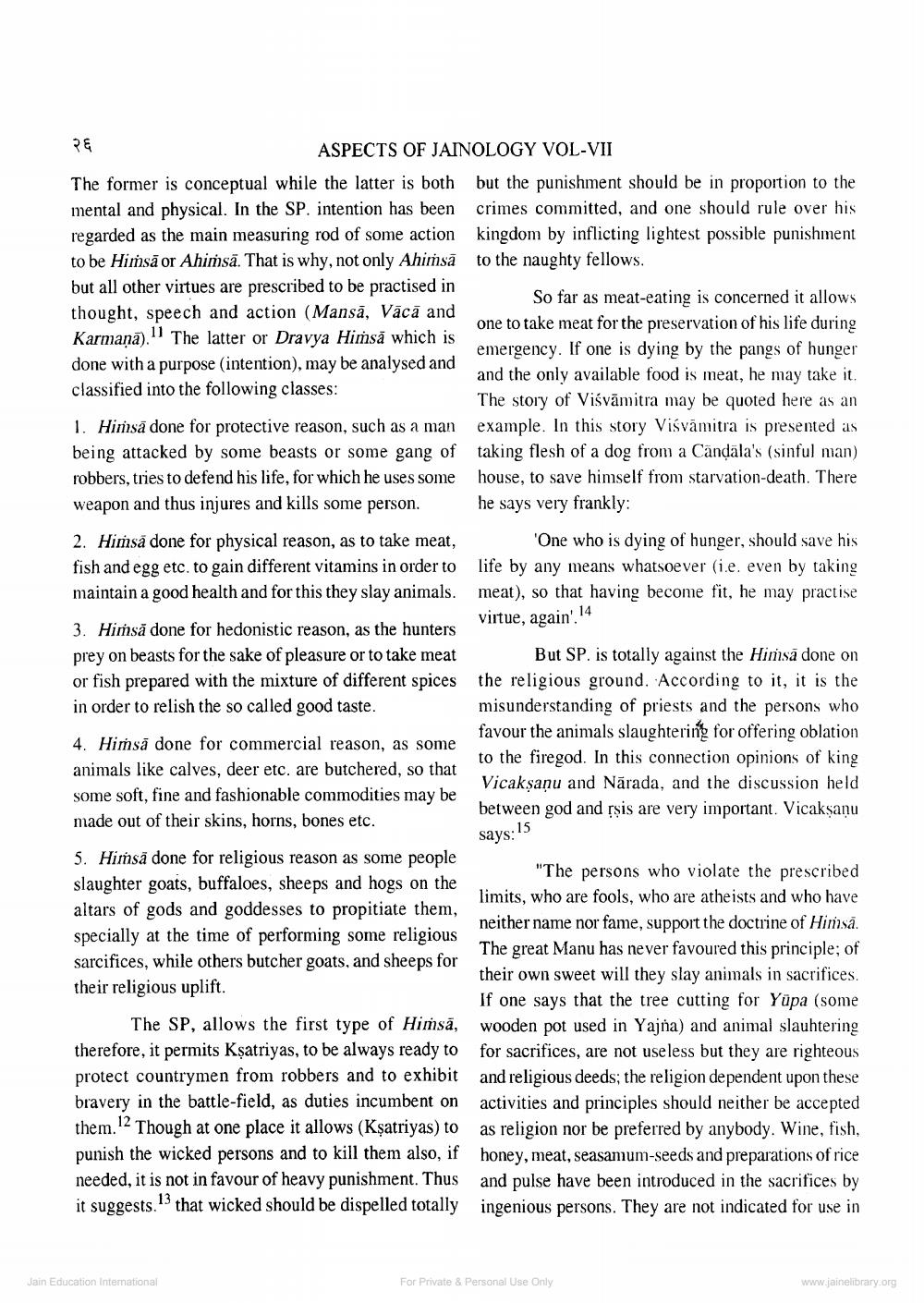________________
२६
ASPECTS OF JAINOLOGY VOL-VII The former is conceptual while the latter is both but the punishment should be in proportion to the mental and physical. In the SP. intention has been crimes committed, and one should rule over his regarded as the main measuring rod of some action kingdom by inflicting lightest possible punishment to be Himsā or Ahimsā. That is why, not only Ahimsā to the naughty fellows. but all other virtues are prescribed to be practised in
So far as meat-eating is concerned it allows thought, speech and action (Mansā, Vācā and
one to take meat for the preservation of his life during Karmana)." The latter or Dravya Hissä which is
emergency. If one is dying by the pangs of hunger done with a purpose (intention), may be analysed and
and the only available food is meat, he may take it. classified into the following classes:
The story of Viśvāmitra may be quoted here as an 1. Himsā done for protective reason, such as a man example. In this story Viśvāmitra is presented as being attacked by some beasts or some gang of taking flesh of a dog from a Candāla's (sinful man) robbers, tries to defend his life, for which he uses some house, to save himself from starvation-death. There weapon and thus injures and kills some person. he says very frankly: 2. Himsă done for physical reason, as to take meat, One who is dying of hunger, should save his fish and egg etc. to gain different vitamins in order to life by any means whatsoever (i.e. even by taking maintain a good health and for this they slay animals. meat), so that having become fit, he may practise
virtue, again'.14 3. Himsă done for hedonistic reason, as the hunters prey on beasts for the sake of pleasure or to take meat But SP. is totally against the Himsă done on or fish prepared with the mixture of different spices the religious ground. According to it, it is the in order to relish the so called good taste.
misunderstanding of priests and the persons who
favour the animals slaughtering for offering oblation 4. Himsă done for commercial reason, as some
to the firegod. In this connection opinions of king animals like calves, deer etc. are butchered, so that
Vicakşaņu and Nārada, and the discussion held some soft, fine and fashionable commodities may be
between god and rsis are very important. Vicaksanu made out of their skins, horns, bones etc. 5. Himsă done for religious reason as some people
"The persons who violate the prescribed slaughter goats, buffaloes, sheeps and hogs on the
limits, who are fools, who are atheists and who have altars of gods and goddesses to propitiate them,
neither name nor fame, support the doctrine of Himsa. specially at the time of performing some religious
The great Manu has never favoured this principle; of sarcifices, while others butcher goats, and sheeps for
their own sweet will they slay animals in sacrifices. their religious uplift.
If one says that the tree cutting for Yüpa (some The SP, allows the first type of Himsä, wooden pot used in Yajna) and animal slauhtering therefore, it permits Kșatriyas, to be always ready to for sacrifices, are not useless but they are righteous protect countrymen from robbers and to exhibit and religious deeds; the religion dependent upon these bravery in the battle-field, as duties incumbent on activities and principles should neither be accepted them.12 Though at one place it allows (Kșatriyas) to as religion nor be preferred by anybody. Wine, fish, punish the wicked persons and to kill them also, if honey, meat, seasamum-seeds and preparations of rice needed, it is not in favour of heavy punishment. Thus and pulse have been introduced in the sacrifices by it suggests. 13 that wicked should be dispelled totally ingenious persons. They are not indicated for use in
says: 15
Jain Education Intemational
For Private & Personal Use Only
www.jainelibrary.org




